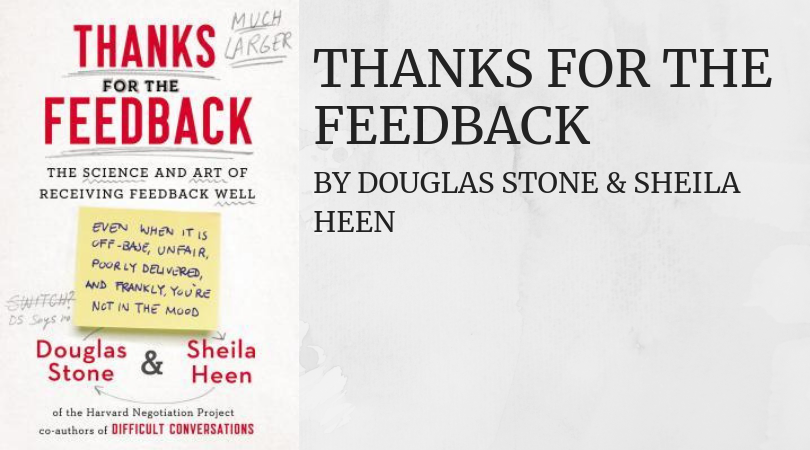As much as I try, receiving feedback (particularly critical feedback) is difficult for me. Online, I still get the chance to take a step back and receive it rationally, but I do freeze up when I get it in real life. So when I heard of Thanks for the Feedback, I knew that I had to read it to see if there were any takeaways.
Thanks For the Feedback defines feedback as “any information you get about yourself… feedback is not just what gets ranked; it’s what gets thanked, commented on, and invited back or dropped.” Later in the book, this feedback is further refined into three categories:
1. Appreciation – about relationships and connections
2. Coaching – trying to help you learn, grow, and change
3. Evaluation – comparing you to others or standards to see where you fall.
As for feedback, there are three reasons why we would ‘block’ it:
1. Truth triggers – we don’t believe that the feedback is correct, fair, or helpful.
2. Relationship triggers – the relationship we have with the person giving the feedback biases is against it.
3. Identity triggers – the feedback threatens who we are as a person.
One thing that I thought was immediately helpful was the point that sometimes, we want a different type of feedback from what we get. We want appreciation but get evaluation, we want coaching but get appreciation, and so on.
Another thing I found helpful was the discussion on how we are ‘wired’ to respond to feedback:
1. Quick recovery from bad feedback, long afterglow from good feedback (these people love feedback)
2. People who bounce back quickly from both negative and positive feedback (they don’t care)
3. People who take a long time to recover from bad feedback but also feel the glow from good feedback for a long time.
4. People who take a long time to bounce back from bad feedback and quickly forget about good feedback (adverse to feedback)
Personally, I think I’m type three – which is why feedback scares me a lot (but good feedback makes me happy for a long time)
After going through what feedback is and why we would respond badly to it, the authors offer suggestions on how to cultivate a growth mindset regarding feedback, namely:
1. Don’t deny the feedback right away, ask more questions and understand it.
2. Find out how you really appear to people. Sometimes, we think we portray one type of character when people see a completely different one.
3. Learn to separate relationships from feedback.
The book ends by pointing out situations where we might not want to take feedback, which I thought was a good way to help set boundaries.
The book goes into much more detail than my summary, with a summary at the end of each chapter. I found it to be very helpful and I made a lot of bookmarks. The action steps here are definitely not something that can be put in action at once, but I can probably do them bit by bit.
If you’re like me and bad at receiving feedback, you might be interested in this book. I found it illuminating with a lot of practical advice.
